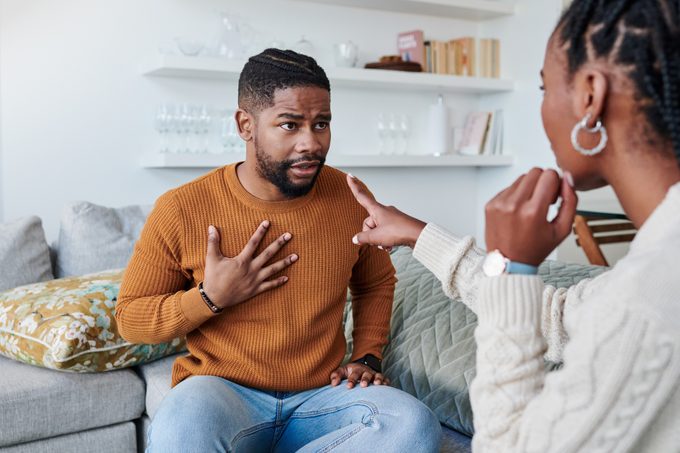Want to know how to spot the telltale traits of an untrustworthy woman or man? This guide will make you an expert.

10 Habits That Untrustworthy People Have in Common

Picture this: You’re at a party where you’re introduced to a charming guest who quickly takes a shine to you, showers you with big-time praise, then offers to connect you to a high-profile person in your profession. Thrilled, you text and email your new friend post-party (more than once!) … but never hear from them again. That’s when you realize you’ve been fooled by the traits of an untrustworthy woman or man.
Don’t beat yourself up—it happens to the best of us. Fortunately, these disappointing incidents can help you get a better read on people in the future, says psychologist Jeff Temple, PhD, a professor and associate dean for clinical research at the School of Behavioral Health Sciences at UTHealth Houston. “Trusting your instincts and previous experiences is an important tool for spotting red flags and choosing whom to spend time with,” he explains. “Life is hard enough on its own. It’s important to seek out trustworthy folks who you can consistently rely on for emotional and practical support, who can be honest with you and help reduce your stress.”
To learn how to quickly distinguish between the good, the bad and the ugly—and even how to trust your partner—Reader’s Digest tapped four savvy experts in the fields of psychology, body language and etiquette. From a lack of integrity to a disregard for etiquette rules and everything in between, here are a few habits that untrustworthy people frequently have in common.
Get Reader’s Digest’s Read Up newsletter for more relationship tips, etiquette, humor, cleaning, travel, tech and fun facts all week long.
They lack integrity
One of the most common traits of an untrustworthy person is a lack of integrity. “Clear violations of integrity include cheating and generally being dishonest,” says Temple, who cites the workplace as frequent stage for this kind of deceit. “A classic example is when a co-worker takes credit for your idea or work and thus prioritizes personal gain over honesty and accountability.”
Another hallmark move? Repeatedly apologizing for bad behavior but not changing that behavior in the future. “A person with integrity keeps their [good] name,” says Patti Wood, a body language expert who trains others in detecting deception and the author of Snap: Making the Most of First Impressions, Body Language, and Charisma.
They don’t trust others

Untrustworthy people don’t trust others, and while this could signify that they’ve been burned by others in the past, it’s often something more. “It can also be projection—that is, they are untrustworthy and think that everyone else must be too, and therefore they are untrusting of others,” says Temple. Examples? An unfaithful partner becomes suspicious of the other partner and accuses them of cheating, or a boss believes his employees will do something dishonest because he’s been doing something underhanded.
“It makes sense that someone who has no qualms about breaking their word and destroying trust cannot imagine that other people could be honest,” Wood says. “What’s interesting is just how broad and deep their lack of confidence is.”
They have a history of being unreliable and inconsistent
Untrustworthy people, not surprisingly, may have a history of being unreliable—which can run the gamut from impolite infractions (like chronic lateness and breaking common etiquette rules) to full-on gaslighting. “They are like slot machines,” says etiquette expert Jodi R.R. Smith, president of Mannersmith Etiquette Consulting. “They know exactly how much they can get away with, and just when you are about to walk away, they do something wonderful so you will stay.” You might also hear repeated apologies from these folks or even find the tables turned unfairly on you (e.g., “I never said I would be here at 1 o’clock—you must have misheard me”).
Traits of an untrustworthy woman or man also include being inconsistent in their emotions and actions, as well as displaying a lack of predictability that can make those around them constantly guessing—just like that party guest who dropped the ball by breaking their promise about the big introduction. “Being congruent, or consistent, across situations and relationships is important,” says Temple, who adds that it’s actually a characteristic to look for in good psychologists too.
They break the rules

Often attributed to narcissistic behavior, chronic rule-breaking can signal that you’re dealing with an untrustworthy person. These people often think the rules don’t apply to them or say they’re too busy to deal with them. Transgressions can be smallish, like habitually running red lights or stop signs “when no one’s looking,” cutting in line or stealing “freebies” from hotel carts. But they can also be larger, more concerning issues, such as cheating on (or not paying) taxes, having affairs and skirting corporate policies at work.
This rule-breaking is often done on the sly, revealed only to those closest to them. According to Wood, it’s important to compare the public image an untrustworthy person puts out into the world (like on social media) with how they act around their inner circle. She explains that although they may seem like fine, upstanding citizens to those who don’t know them well, they often show their true natures when they are with intimate friends and family or those with less power.
They don’t take your feelings into account
Have you ever tried to explain that something made you uncomfortable, but the other person doesn’t seem to care? “A trustworthy friend or partner should recognize how things affect you,” Temple says. And once you tell them something that makes you feel uneasy (like a joke), it’s important they acknowledge your feelings and change their behavior. “If, instead, they continue making that joke and insist it’s ‘just a joke,’ that’s a red flag that your friend may lack empathy and respect for you and your feelings,” he explains.
They lack empathy
And speaking of empathy, being able to put yourself in someone else’s shoes is an incredibly important part of listening, getting to know another person and basically being a good human. The lack thereof is definite cause for concern. Let’s take the example of a wife who complains to her husband about her increasingly stressful job. Maybe her co-workers are being competitive, or the boss is putting too much on her plate and not giving feedback or validation. The natural place to unload is a sympathetic partner. But instead of listening and trying to understand, an untrustworthy person does the opposite—and sometimes even turns the tables.
“He tells her she’s being dramatic and that she should stop complaining—like, ‘You think YOUR job is hard? You should try being in MY office for a day!'” Temple says. “This demonstrates a lack of empathy by dismissing feelings, being unable to relate to what the other person is going through, judging reactions or [only] focusing on themselves and what they’re going through.” The bottom line? You shouldn’t say these things to a partner.
They ignore personal space and boundaries

Whoa—back it up, buddy! If you find yourself thinking this around someone you don’t know well, it could be a red flag. That’s because people who are untrustworthy often invade other people’s personal space and time. “They may touch you in an overly familiar way when you have just met and may ignore or enjoy it when you freeze or pull away,” says Wood, who explains that toxic people can view boundary-breaking as a game to see how much they can get away with.
Sometimes, it’s harmless but annoying (putting a hand on your knee while talking, or repeatedly pushing you to get together when you’ve turned them down) and may just be an indicator of a touchy-feely or overly enthusiastic/clueless human. This behavior could also be due to cultural differences, since in some cultures “physical space is considered more communal, and standing very close to others and being more ‘high-contact’ is a common practice,” notes etiquette expert Laura Windsor, author of Modern British Manners. Other times, it can be a signal that you are in the presence of a toxic or dangerous person.
How to know what you’re dealing with? Wood suggests tapping into your body as a warning system. “Check in with how you feel physically. In the presence of a dangerous person, you may have an increased heart rate and pulse, feel a flush to the skin, and your adrenaline may go up. Don’t misinterpret that as excitement or attraction,” she cautions. “If you do a body check-in and feel good and relaxed rather than tense when someone touches or stares at you, then that’s [likely] a healthy attraction.”
They dominate the conversation
There are a few additional signs you can’t trust someone, and one is the rude habit of dominating a conversation. “This ‘over-talking’ involves auditory space invasion and other paralanguage factors that show they are in control,” says Wood.
Sure, there are plenty of folks who simply enjoy talking energetically and frequently. But there are others who need to have the spotlight on them at all times. “Let’s say you share a recent big accomplishment or something sad. How does the other person respond?” posits Wood. She explains that a mentally healthy, caring person would listen, “hear” your emotional state and respond supportively—for example, “You must feel so great about that success!” or “That sounds like it was challenging. I’m so sorry you had to go through that.” An untrustworthy person, on the other hand, may try to one-up you with their own accomplishment or woe-is-me story.
They tend to blame others

“Blaming others—especially for something that is at least partially their doing—can signal a lack of accountability and undermine trust in a relationship,” says Temple. “In an intimate relationship, this might take the form of blaming your partner for a credit card bill, even when both partners were equally responsible for the expenses.” It can also show up in platonic relationships, like if you highlight something a friend has done that upsets you, and instead of reflecting on the behavior, the other person responds by automatically bouncing back something they don’t like about you.
Granted, blaming others isn’t necessarily a slam-dunk when it comes to identifying an untrustworthy person, especially if they are otherwise generally honest and empathic. But it does frequently show up in toxic personalities. “Remember that untrustworthiness, like many character traits, is made of several factors that must all be taken into account,” says Temple.
They have over-the-top, “ideal” behavior
Love bombing. Delivering constant compliments. Giving extraordinary gifts. All of these seemingly intoxicating moves can actually be traits of an untrustworthy woman or man; ironically, they can also be well-intended generosity. So how can you spot the distinction? Just like personal space and boundaries, your emotions and how you feel about the behavior is the tipoff.
“Love is a wonderful emotion, but when it rains down on you so much that you feel overwhelmed, it could be toxic,” says Wood. This applies to words, gifts and even touch. “Having someone whisper that you’re beautiful is wonderful and healthy; delivering constant over-the-top compliments until you feel uncomfortable and off-balance is not.” Likewise, getting flowers or receiving a T-shirt of your favorite band is appreciated, but an avalanche of expensive gifts that you can’t possibly reciprocate—even from a platonic friend—feels like overkill.
Wood believes the same imbalances apply to physicality. “Holding hands is great,” she says, “but always touching and holding tight to you when you are around other people is [a red flag].” So trust your inner voice, and when you feel a no instead of a glow, tread carefully.
What should you do when talking to someone untrustworthy?
Once you identify someone who appears to be untrustworthy, don’t ignore it. This is true whether you’re dealing with someone you’ve just met, a friend or a long-term partner, though the strategies differ depending on the specific situation, of course.
“If you’re in a new relationship, rely strongly on your intuition and prior experiences, and if you get a bad vibe, proceed with caution,” Temple says. “If you’re in an existing relationship and this seems like new behavior in your partner or friend, be empathetic and see if there’s something in their life that is stressing them out.” Then, should the behavior continue, especially if it’s paired with other red flags and your own feelings of unease, investigate further.
Below, our experts offer a few smart tips to help you take control of situations—or find safety when you need it.
Gauge your level of safety
The more you get to know someone, the easier it will be to identify untrustworthy behaviors. But it’s not always so clear-cut at your first meeting, at which time Wood says it’s important to establish whether or not you feel safe. “If you feel uncomfortable, just get away from the person and don’t feel bad or worry about being rude—just leave,” she advises. A good person won’t make you feel badly when you bid a hasty exit.
Trust your gut
“If something feels off, or if you feel sad or upset or embarrassed after spending time with someone,” says Temple, “that’s a red flag and should alert you to be wary of divulging secrets or devoting your energy to that person.”
Smith also recommends learning to differentiate between what a person is saying versus what they are doing: “My grandmother always said, ‘Never trust someone who says, ‘Trust me.’ They are lying or trying to trick you.’ Untrustworthy people rely on your listening to their words instead of their behavioral cues.” She adds that when people lie, their tone of voice changes and they have a “tell”—meaning their voice will change or they will turn most of their body away from you. While Windsor notes that this body language can also signify that the person has simply lost interest, it’s important to look at this behavior in the larger context of what else is going on and how it’s making you feel.
Believe your friends
“Listen to your friends who have proved themselves to you, the ones you already know are trustworthy,” says Temple. “If they’re alerting you to red flags in your new friendships, relationships and colleagues, believe them. It doesn’t mean you need to give up on the other person immediately—just to be on the lookout.”
Have a backup plan
When dealing with an untrustworthy person, be kind and pleasant, but always have a backup plan. “They say they are bringing all of the wine for Thanksgiving? Be sure to buy some anyway for when they arrive empty-handed,” says Smith. They told you their part of the project will be completed by Tuesday? Email them a thank-you reiterating the details and cc your boss. They promise to pick you up at the airport? When you don’t see them after 10 minutes and they haven’t answered their phone, hop in an Uber and text them that you look forward to seeing them later.
About the experts
|
Why trust us
For over 100 years, Reader’s Digest has explored the nuances of relationships, working with such luminaries as Dr. Ruth Westheimer, John Gottman, PhD, and Leo Buscaglia (“Dr. Love”). We ran a decade-long relationships column and have published a compendium of features, Love and Marriage: The Reader’s Digest Guide to Intimate Relationships. For this piece on the traits of an untrustworthy woman or man, Madeline Wahl tapped her experience as a journalist and former Reader’s Digest editor. Then, Laura Windsor, a U.K.-based etiquette expert who was trained by a member of Queen Elizabeth II’s household and now advises international royals, celebrities and regular people, gave it a rigorous review to ensure that all information is accurate and offers the best possible advice to readers. We support this information with credentialed experts and primary sources such as government and professional organizations, peer-reviewed journals and our writers’ personal experiences where it enhances the topic. Read more about our team, our contributors and our editorial policies.
Sources:
- Jeff Temple, PhD, professor and psychologist at the School of Behavioral Health Sciences at UTHealth Houston; email interview, September 2024
- Patti Wood, speaker, trainer and author of Snap: Making the Most of First Impressions, Body Language, and Charisma; email interviews, October 2024 and October 2020
- Jodi R.R. Smith, president of Mannersmith Etiquette Consulting and author of The Etiquette Book: A Complete Guide to Modern Manners; email interview, October 2020
- Laura Windsor, etiquette expert and author of Modern British Manners; email interview, March 18, 2025
























